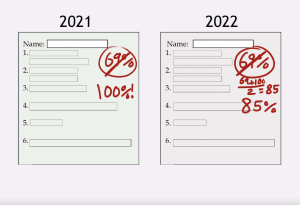Test retake policy change hinders students
February 26, 2022
Midtown has decided to change the school-wide test retake policy for the spring semester. Before the policy change, a new test grade would replace the failing one, allowing students to get a complete do-over. By putting these new and unnecessary restrictions on test retakes, Midtown isn’t eliminating cheating and is instead penalizing students who are trying to improve their grades.
By averaging the two scores, the school is ensuring that a student’s first attempt, no matter how bad, will hurt them, even if they show marked improvement. Now, the highest grade possible to get on a reassessment is an 85, and that’s only if a student scores the highest score eligible for a retake on the original test, which is a 69 and a 100 on the retake. This can discourage students from trying again by making them believe that retesting is a waste of time.
However, these second chances are extremely beneficial in adolescence, when students are still learning about the world. A study found that failing a test can actually succeed in helping students learn the right answer by trying and failing first. By allowing students to embrace and identify their mistakes, deeper, more meaningful learning will occur.
Most teachers require a tutorial session before the retake to allow students to ask questions, review and learn from their past mistakes. Studies show that after tutoring, students can significantly improve their scores. But this policy does not let students completely fix their mistakes, instead only letting them slightly improve their scores, even after all of their extra work at tutorial.
Failing one test can bring down your entire test average, ultimately bringing down your grade. Having a safety net previously provided by retakes was extremely beneficial for students, and didn’t harm their preparedness for college or real life. If anything, high school students shouldn’t be held to the same standards as college students or adults, yet this policy change insists on holding them to those impossibly high standards.
The reason for the change was most likely due to cheating. Some students would purposely fail the original test to get the answers and ace the retake with no penalties. While this was the case with some students, most genuinely didn’t do well on their first attempt and wanted to try again. These students want to be able to learn from their mistakes, but because of the new policy, they are being unfairly penalized due to the actions of others.
Though there was some cheating during retakes, not every student cheats. This new policy is unfair for the students who didn’t cheat and truly wanted to improve their grade and do better. This policy does not allow this crucial academic development to take place. The old policy must be reinstated in order to give those students a fighting chance in this new, virtual era of cheating and deception.







